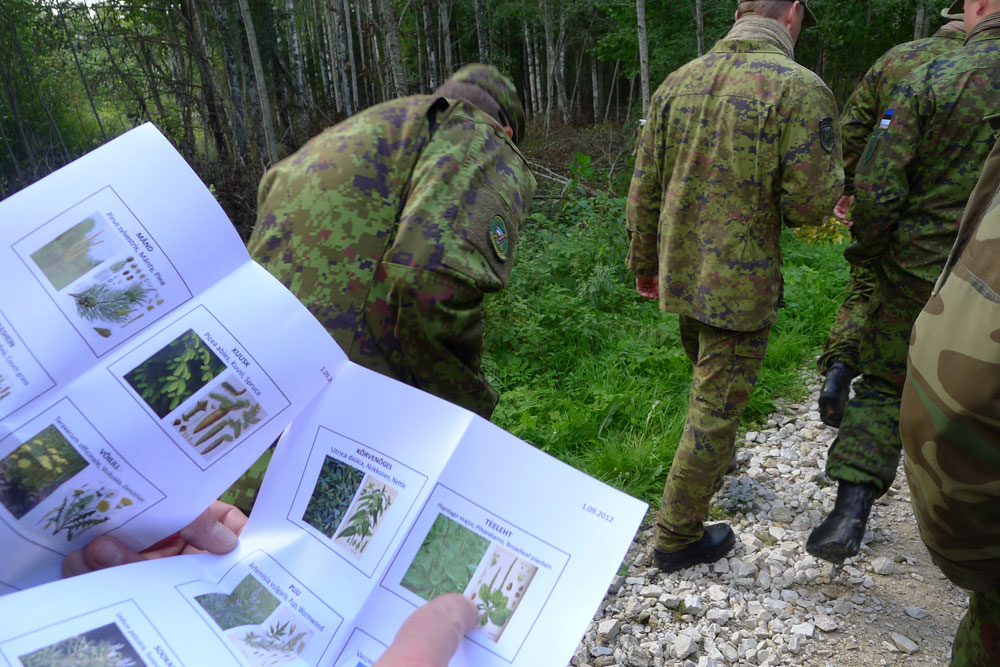Survival First Aid Training in Estonia
Christo Motz looks at a recent course organised by the Estonia Defence League, which aims to teach participants how to achieve self-sufficiency in times of crisis.

Identifying medicinal plants
Upon invitation of First Lieutenant Erki Vaikre, co-ordinator of the Kaitseliidu Kool, the Survival School, I made a brief visit from Friday, August 31, to Sunday, September 2, 2012. The training centre lies near the village of Kirna, about 150km southeast of Talinn.
The school is located on a former Russian army base, dominated by a brand new angular army building, flanked by a number of decrepit stone barracks, which appear to symbolise the bygone era of Soviet rule. The terrain is located within a vast nature reserve called Alam-Pedja Looduskaitseale. The reserve is full of inaccessible swamps ruled by stinging mosquitoes and horseflies, but also has shiny white birch trees which stand out against stark blue magical skies in which dreamy clouds seem to just glide past.
This was the first time the Estonian Defence League had held this two-day course for over 40 medics and other military personnel, and they asked me to attend so that I could advise and contribute to further improving and developing the course.
The essence of the course is the fundamental connection between survival and medicine. Our physiological and mental system is based on, and consists of, numerous processes which keep us alive. When the heart stops pumping, that is an existential (physical) fact and five minutes later we are dead. In that sense you can say that our body and spirit are inextricably connected. Our health is also determined by the quality of our breathing, motion level and nutrition.
For emergency services and military units which find themselves in tactical situations, it is clear that stressful situations can place immense pressure on physical and mental systems, leading to life-threatening situations.
Whether you live in the over-regulated Netherlands or in the sparsely populated Estonia, a situation can occur in any persons' life where you find you must depend on one another for an indefinite period of time. This could be because you are lost and trapped in a swamp or alpine area, or have witnessed a major disaster in an urban area with numerous deaths, wounded and ill persons.
The level of (individual) resilience and self-sufficiency can possibly mean the difference between life and death.
The scenario for the survival first aid training course in Estonia is that the emergency services cannot be reached, or do not have the capacity to provide relief, which is why participants need to rely on themselves and their fellow companions.
It is about learning to secure your own safety, recognising danger signals, regulating breathing and learning to deal with fear and stress. It is also includes learning basic anatomy and physiology, elementary first-aid techniques, the influence of our environment on our system and how best to protect ourselves from a (potentially hazardous) environment.
In Sweden, Finland and Estonia, knowledge of flora and fauna is an essential part of survival training and healing herbs and plants are used when treating trauma victims, for instance to stop bleeding and to promote the healing of wounds.
It is essential that participants learn to improvise with only minimal available resources. This ability is stimulated in an open and safe learning environment, where a critical exploring mind and the ability to take on responsibility for one's actions should be central. The training takes place in the field under basic conditions, where thinking and acting 'out of the box' is a prerequisite to be able to save oneself.
This is why it is essential to let go of all assumptions and to train the individual in asymmetrical and contrary thinking (and acting) and placing responsibility back on the individual.
Christo Motz, International Consultant on Survival and Resilience and Member of CRJ's Editorial Advisory Panel, the Netherlands (www.fylgjur.com)
Christo Motz, 07/09/2012